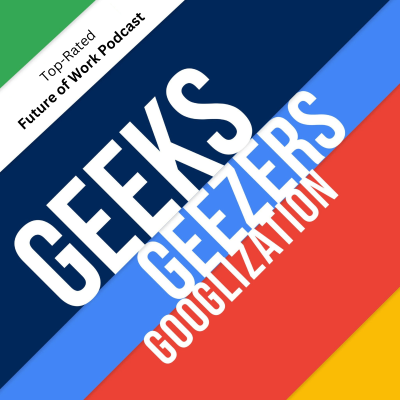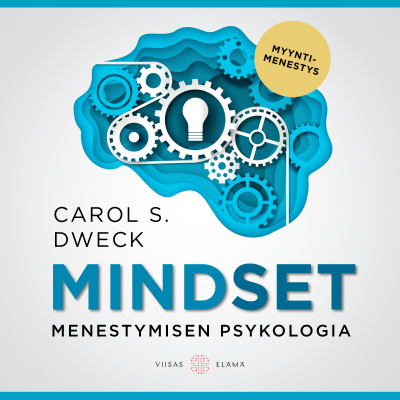
Geeks, Geezers, and Googlization Show
Podcast by Ira S Wolfe
If you think this is just another podcast, think again. We are the voice of the most important crucial conversations confronting business leaders and people today. Our goal is to bring you ways to reimagine tomorrow and explore the impact and convergence of business, technology, and people. Recognized as one of the top all-time leadership and management podcasts (Goodpods), top leadership podcast (Podcast Tonight), top 1.5% of all podcasts (Listen Notes), Top 100 podcast (Chartable) to mention a few!
90 vrk ilmainen kokeilu
Kokeilun jälkeen 19,99 € / kuukausi.Peru milloin tahansa.
Kaikki jaksot
420 jaksotReady to hack your happiness? In this episode of Geeks, Geezers, and Googlization, neuroscientist Dr. Paul J Zak (aka Dr. Love) sits down with host Ira S Wolfe to shatter the myths of happiness. Forget everything you thought you knew—happiness isn’t just luck or “soft skill” fluff. It’s hardwired biology, measurable in real time, and absolutely essential for thriving at work and life. Whether you’re a leader seeking to boost culture, an innovator obsessed with productivity, or simply a geek (or geezer) wanting less stress and more joy, this episode is a must-listen. Who should listen? * Anyone who thinks happiness is an afterthought or side effect of success * Leaders, HR pros, & changemakers who want to build high-performing, emotionally fit teams * Every individual tired of “good vibes only” advice and ready for scientifically-backed happiness hacks 3 Compelling Takeaways: 1. Happiness Is Chemistry, Not Chance: Discover why Dr. Zak says the happiest people are “wired for it”—and how his SIX app can literally measure if your heart is full before your brain realizes it. 2. Connection Is Contagious: Learn how your strongest relationship moments give you “immersion spikes,” and why surrounding yourself with thriving, supportive people is neurologically contagious. 3. Virtue Is Your Secret Advantage: Uncover the 45 virtues powering happiness (spoiler: caution makes the cut!) and why balancing paradoxical traits like adaptability and awe rewires your brain for joy, resilience, and better decision-making. Get ready to reboot your operating system for happiness—because the future doesn’t care if you’re ready. About Dr. Paul Zak: Dr. Paul J. Zak is the neuroscientist who made love measurable and happiness trackable. Known as “Dr. Love,” he’s the pioneer behind the discovery of oxytocin’s role in trust, the creator of the first neurologic wearable for emotion, and the author of The Little Book of Happiness. His work rewires how we understand joy, connection, and purpose—from the boardroom to the brainstem. Buy the Book "The Little Book of Happiness: [https://www.amazon.com/Little-Book-Happiness-Scientific-Approach/dp/1544547889] https://www.amazon.com/Little-Book-Happiness-Scientific-Approach/dp/1544547889 Learn more about Paul: https://pauljzak.com [https://pauljzak.com] Connect with Paul: https://www.linkedin.com/in/paul-j-zak-91123510/ [https://www.linkedin.com/in/paul-j-zak-91123510/]
Forget what you’ve been told about what’s driving division, disengagement, and dysfunction. It’s not woke and DEI. It’s not remote work. It’s not Gen Z or political affiliations. According to Dr. Zach Mercurio, it’s something far more primal: the deep, unmet need to matter. In this gut-punch of an episode, Zach and host Ira S Wolfe rip into why belonging programs fall flat, expose the myth about soft skills, and reveal why making someone feel seen isn’t a nice-to-have—it’s survival. You’ll never look at leadership, work, or human connection the same way again. Perks don't create a vibrant culture. They’re distractions from the fact no one feels like they belong. Ping-pong tables and catered lunches won’t fix your toxic culture. Start with making people feel like they matter. If you give a damn about your people—this is required listening. Order the book: The Power of Mattering (https://www.zachmercurio.com/the-power-of-mattering/) [https://www.zachmercurio.com/the-power-of-mattering/)] Download "Mattering" resources: https://www.zachmercurio.com/mattering/ [https://www.zachmercurio.com/mattering/] Connect with Zach: https://www.linkedin.com/in/zachmercurio/
Yep! Change often feels like swimming upstream against sticky currents. Even if the status quo is a mess, we cling to it like a life raft. Why? Because the familiar feels like less work for our brain, even when it’s failing us. In this episode, guest co-hosts Eli and Casey unravel the complex web of emotions and instincts that make embracing change feel like swimming through sticky peanut butter. Inspired by future of work thought leader Ira Wolfe's insights, this deep dive is your ticket to understanding the messy, human side of transformation. Here's what you’ll uncover: * Our Addiction to Certainty: Our brains are wired to see uncertainty as a threat. Some call this status quo bias. Like survival mode, this triggers a primal response in us. Knowing why change feels unsettling is step one in managing it. * Loss Before Gain: Change almost always feels like a loss initially, even if it leads to greater benefits later. It's crucial to acknowledge and address this sense of loss to help people move forward. * Culture and Control: The norms and culture of our "tribe" are formidable forces. Ignoring them can lead to resistance. Moreover, people need a sense of control. Ensuring involvement and offering ownership of the change can dramatically reduce pushback. Dive deeper into this episode and let's continue the conversation on how to lead through change effectively and make change work for you.
Step into the whirlwind of change with this episode of Geeks Geezers Googlization: "Adaptive Perception Disorder." Guest co-hosts Eli and Casey take a Deep Dive into the eerily familiar yet subtly dangerous mindset threatening the backbone of businesses today. They delve deep into the intriguing concept of Adaptive Perception Disorder (APD), coined by GGG host and Future of Work Global Thought Leader Ira Wolfe himself. Why is exploring APD important? ADP is endemic in many companies, a mindset that causes them to believe they’re on top of change when they’re actually way behind. It’s calling the hurricane a light breeze. Adaptive Perception Disorder (APD) might not be the buzzword yet, but it certainly highlights a crippling blind spot in many organizations. Here are top three takeaways: * Spot the Symptoms: Organizations often suffer from outdated strategy decks and vague positivity about being "on track." It’s crucial to recognize these signs as they could indicate a dangerous disconnect from reality. * Understanding APD Subtypes: APD manifests in various forms like Perceptual Change Deficiency and Strategic Narcissism. Identifying these can help in addressing areas where adaptation might be lagging. * Build Adaptability Intelligence (AQ): It’s about fostering a culture of constant learning, questioning existing knowledge, and embracing discomfort to truly evolve and stay ahead.
Feel like the world’s spinning faster than ever? You’re not wrong—and “just go with the flow” won’t cut it anymore. Join us for another Deep Dive in this provocative episode of Geeks Geezers and Googlization. Guest hosts Casey and Eli dive deep into the Adaptability Deficit, a term coined by Ira S Wolfe, and why it might be the single greatest threat to your personal and professional survival. We unpack why flexibility is reactive, adaptability is proactive, and why your success now hinges more on your AQ (Adaptability Quotient) than your IQ or EQ. You’ll learn: * The crucial difference between being flexible and being adaptable * Why adaptability is a skill, not a personality trait * How to identify your adaptability blind spots * The 5 essential steps to build your adaptability muscle—starting now In a world that’s “never normal,” it’s not the smartest or strongest who thrive—it’s the most adaptable. So… are you ready to evolve? Hit play and future-proof your life.
90 vrk ilmainen kokeilu
Kokeilun jälkeen 19,99 € / kuukausi.Peru milloin tahansa.
Podimon podcastit
Mainoksista vapaa
Maksuttomat podcastit
Äänikirjat
100 tuntia / kk

































